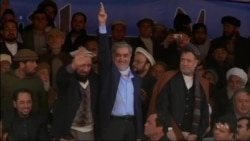Voters in Afghanistan go to the polls Saturday, June 14 for the presidential runoff election that is expected to pave the way for the nation’s first peaceful, democratic transfer of power. But the election comes during a violent insurgency, and Taliban militants are threatening to disrupt the polls.
Ignoring intimidation from the Taliban, large crowds of Afghans are turning out for campaign rallies.
Ashraf Ghani
Former foreign minister Abdullah Abdullah won 45 percent of the vote in the first round and is considered the front-runner.
However, he is of mixed Tajik and Pashtun heritage in a country where rulers traditionally have come from the Pashtun community, the nation’s largest.
Challenging Abdullah is former World Bank economist Ashraf Ghani, who garnered 32 percent of the first round vote.
Ghani is a Pashtun who has roots in eastern Afghanistan.
While both candidates have been campaigning enthusiastically, in Afghanistan violence is never very far away.
Just days before the election, Abdullah narrowly escaped assassination when two bombs struck his convoy.
The Afghan constitution says new elections must be held in the event of a candidate’s death.
South Asia expert Christine Fair:
“So I am going to be holding my breath until we actually get to the runoff and there is a winner, because, at any point until the president is announced the entire exercise can be obviated by an assassination of one of the candidates," said Fair.
The winner of the second round will replace President Hamid Karzai, who is barred by the constitution from running for re-election.
The vote comes at a pivotal time, as the international community prepares to withdraw combat forces by the end of this year.
Some U.S. troops will stay in Afghanistan if the country’s next president signs a Bilateral Security Agreement with Washington.
President Karzai has refused to sign the deal.
But both Abdullah and Ghani have pledged to approve it.
“These are the things that help with the perception of security and also creating certainty rather than the shadow of uncertainty which is there," said Abdullah.
President Karzai has frequently blamed Pakistan for supporting militant groups that have launched brazen attacks in Afghanistan.
Analysts say the current candidates are likely to have a more positive relationship with Islamabad.
Ashraf Ghani:
“The goal is a special relationship between Afghanistan and Pakistan that would resemble that of France and Germany after World War II," said Ghani.
The U.S. and NATO have trained Afghan security forces.
But analysts say there still must be reconciliation between the government and the Taliban.
Christine Fair:
“If this election goes forward and there isn’t an endgame to bring the Taliban to the table, I really don’t see this being a lasting peace," she said.
Currently about 30,000 U.S. soldiers are in Afghanistan.
About 2,200 Americans have died in the conflict.
Ignoring intimidation from the Taliban, large crowds of Afghans are turning out for campaign rallies.
Afghan Elections Candidates
Abdullah Abdullah- Received 45 percent of vote in first round of presidential election
- Served as Hamid Karzai's foreign minister
- Ran for president in 2009
- Was an eye doctor
- Father is Pashtun, mother is Tajik
Ashraf Ghani
- Received 32 percent of vote in first round of presidential election
- Served as Hamid Karzai's finance minister
- Ran for president in 2009
- Former World Bank official and professor at Johns Hopkins University
- Pashtun
However, he is of mixed Tajik and Pashtun heritage in a country where rulers traditionally have come from the Pashtun community, the nation’s largest.
Challenging Abdullah is former World Bank economist Ashraf Ghani, who garnered 32 percent of the first round vote.
Ghani is a Pashtun who has roots in eastern Afghanistan.
While both candidates have been campaigning enthusiastically, in Afghanistan violence is never very far away.
Just days before the election, Abdullah narrowly escaped assassination when two bombs struck his convoy.
The Afghan constitution says new elections must be held in the event of a candidate’s death.
South Asia expert Christine Fair:
“So I am going to be holding my breath until we actually get to the runoff and there is a winner, because, at any point until the president is announced the entire exercise can be obviated by an assassination of one of the candidates," said Fair.
The winner of the second round will replace President Hamid Karzai, who is barred by the constitution from running for re-election.
The vote comes at a pivotal time, as the international community prepares to withdraw combat forces by the end of this year.
Some U.S. troops will stay in Afghanistan if the country’s next president signs a Bilateral Security Agreement with Washington.
President Karzai has refused to sign the deal.
But both Abdullah and Ghani have pledged to approve it.
“These are the things that help with the perception of security and also creating certainty rather than the shadow of uncertainty which is there," said Abdullah.
President Karzai has frequently blamed Pakistan for supporting militant groups that have launched brazen attacks in Afghanistan.
Analysts say the current candidates are likely to have a more positive relationship with Islamabad.
Ashraf Ghani:
“The goal is a special relationship between Afghanistan and Pakistan that would resemble that of France and Germany after World War II," said Ghani.
The U.S. and NATO have trained Afghan security forces.
But analysts say there still must be reconciliation between the government and the Taliban.
Christine Fair:
“If this election goes forward and there isn’t an endgame to bring the Taliban to the table, I really don’t see this being a lasting peace," she said.
Currently about 30,000 U.S. soldiers are in Afghanistan.
About 2,200 Americans have died in the conflict.





